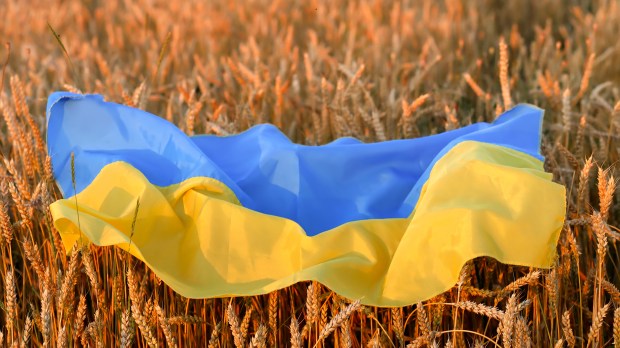On Sunday, March 6, the Ukrainian Government imposed export restrictions on key agricultural products, including wheat, corn, poultry, eggs, and sunflower oil. In reaction to this decision, the following day the price of wheat on the world market reached an all-time high of $1,294 per bushel (compared to $824 before the Russian invasion). Similarly, at the end of February, the FAO Food Price Index reached its highest level (140.7 points).
Before long, on March 9, the Ukrainian embargo was considerably tightened. The government in Kyiv imposed a strict ban on exports of rye, barley, buckwheat, millet, sugar, salt, and meat. On March 12, the list of products excluded from export was extended to include fertilizers, of which Ukraine is a leading producer.
The above restrictions are especially cumbersome for North African and Middle Eastern countries, which to a large extent rely on imports of Ukrainian produce. For example, Lebanon must import as much as 90% of cereals from Ukraine (and Russia); the figure for Egypt is around 86% and around 50-60% for Tunisia. Syria, Libya and Somalia, ravaged by a humanitarian crisis, are in a similar situation.
However, even before the announcement of an official embargo by Kyiv, the Russian navy would open fire on civilian merchant ships trying to set sail from the ports of the Black Sea. For example, on February 25 a rocket hit The Namura Queen. This Panama-flagged vessel was used to carry grain to Turkey. In turn, many countries closed their ports to Russian merchant ships, also filled with grain, as part of the sanctions.
According to Bloomberg’s latest data, Egypt has grain supplies for around four months. In time, the population of this country of more than 100 million will face steep increases in food prices and possibly famine. In conflict-ridden Libya, which has no adequate grain supplies, the price of flour has risen by 30% over the past week.
Are we in for another Arab Spring?
The UN’s Food and Agriculture Organization (FAO) estimates that within the next few months, as many as 8-13 million people in North Africa may be afflicted by hunger. Replacing such immense grain supplies with deliveries from other sources is simply unfeasible in such a short period of time.
Bloomberg’s experts point out that in 2010 a similar food crisis caused by a catastrophic drought led to the outbreak of social protests known as the Arab Spring. The aftermath of those events is a migration crisis that has continued to this day and the protracted civil wars in Syria, Yemen and Libya.
Not surprisingly, some commentators have begun to see the above events as part of Vladimir Putin’s plan to destabilize Europe by ever new waves of desperate refugees. The constant shelling of civilian buildings in Ukraine would serve a similar purpose.
What lies in store for Europe?
The situation on the global food market will be aggravated by the rising price of gas, essential in the production of fertilizers, and a decrease in the supply of animal feed, of which Ukraine is also a major exporter. Transportation costs in general will increase by several dozen percent due to skyrocketing oil prices. As a result, the cost of food production will rise significantly even in countries with a relatively high level of their own agricultural production.
In addition, the catastrophic drought in North America and other regions of the world has also affected global production. The world’s grain warehouses have an extremely low level of stock due to a significant drop in consumption during the COVID-19 pandemic. China and India remain the only countries with stock capable of mitigating the effects of the crisis. The question, however, is whether they will decide to release them for world markets in the face of falling production and their own huge populations.
In an analysis released before the Russian attack, Credit Agricole experts forecasted this year’s food price growth at around 6.7%. Conservative estimates by the same authors from February 28 indicate increases of over a dozen percent. However, in the current volatile international situation, even rough estimates may prove very much off the mark.
Can Zelensky and the Russians speak in unison?
Interestingly enough, if we were to find an issue where Volodymyr Zelensky speaks with one voice with the Russian occupation authorities it is the question of the crop sowing campaign. Early March is the time when Ukrainian farmers traditionally start working in the fields. Both the Kyiv government and the temporary commanders of the occupying authorities are encouraging them to carry on with field cultivation.
However, the motivations of each side are different. Zelensky is intent on providing food for the inhabitants of the invaded country. The Russians, on the other hand, assume that the Ukrainians, busy working on the land, will not bother to put up resistance (or to appropriate Russian military equipment). The invaders went as far as to promise farmers from the occupied Kherson to open the Russian market to their produce.
It would be unthinkable for Ukrainian farmers to return to full-time work in the regions affected by the warfare. Furthermore, in some places field cultivation is impossible as large areas around cities have been mined and the fields themselves have been destroyed by the fighting. According to UN estimates, arable land in Ukraine will be about 30% smaller than last year. There are also more and more frequent reports of the occupying forces seizing or destroying agricultural machinery and vehicles.
The situation in Ukraine has thus changed 180 degrees from pre-war predictions of an abundant harvest. On a day-to-day basis, however, the biggest food problem continues to be the impossibility of delivering supplies to the cities besieged by the Russians, most notably Mariupol.


